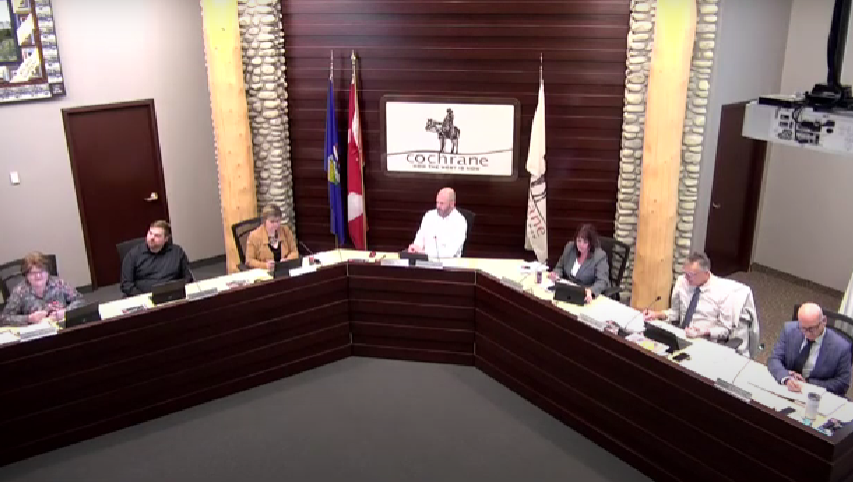As part of this week’s budget news, the province announced Friday that Cochrane was getting a new K-8 school in Rivercrest.
Mayor Jeff Genung said he was thrilled to hear the news.
“I’m ecstatic. Like, over the moon,” he said.
“Didn’t really see that one coming, but I had my fingers crossed that the province would acknowledge the need for schools in Cochrane; the fact they saw that need and are choosing to fund it is amazing news,” he said.
Part of the goodwill Genung said he’s feeling from Edmonton is rooted in the work being done by the Alberta Mid-Sized Cities Mayors’ Caucus (MCMC), which he chairs.
While he stopped short of taking credit, he said it was encouraging.
He referred to the MCMC at his State of Cochrane address the night before as well, and reiterated with The Eagle in an interview that the process is bearing fruit.
The purpose of the MCMC is to “call on provincial party leaders to commit to developing a framework that ensures a meaningful, working partnership is built” with municipal leaders.
He said the funding of schools and health care in places like Cochrane and Airdrie shows the advocacy is having an effect.
“It’s a testament to the work we’ve been doing, asking them to acknowledge the growth,” he said.
“It’s a start but we need more.”
He said the real highlight last Friday was a letter he just received from Municipal Affairs Minister Ric McIver that contained some news that seemed directly pertinent to Cochrane (aka the fastest growing community in Alberta).
“There were no surprises until I got to the end, and there’s an announcement of a $60M grant over the next three years, that will be made available to extremely fast-growing cities,” he said.
“That made my day. That’s exactly us.”
He said seeing the province acknowledge what the mayors of Airdrie and Cochrane and other fast-growing towns have been preaching with provincial officials was gratifying.
Province pitches in to help with infrastructure
As far as the rest of the provincial budget was concerned, Cochrane came out relatively unscathed as compared to some other similar municipalities, especially those who actually started to make their feelings known before budget day, when they became aware of how a new provincial funding formula would affect them.
The Local Government Fiscal Framework (LGFF) comes into effect this year, replacing the Municipal Sustainability Initiative (MSI). It is a provincial government formula geared to calculate how much funding the province will provide municipalities for pressing infrastructure needs.
A number of municipalities are complaining they will see a reduction in expected funding resulting from the new LGFF.
Cochrane does not number among those feeling they’re hard done by, as they actually will receive an increase over the old formula, according to Genung.
“It’s a minor one for this year, and we’ll receive a pretty significant increase next year,” he said.
“I think they’re putting the money where they need to,” he added.
Province prepares for economic impact of drought
Another area targeted for new provincial funding that could affect the Cochrane area (along with many other areas of the province) is drought preparation.
The province plans to spend $251 million over the next three years to combat drought.
It’s also spending $19 million to create a “modern, 21st century water strategy” to increase water availability through water storage projects, conservation, data systems and stronger water policies. Also, $125 million will be invested over the next five years for Alberta’s new Drought and Flood Protection Program. This program is designed to help vulnerable municipalities and Indigenous communities across the province develop the long-term infrastructure needed to improve their drought and flood resilience and adapt to severe weather.
“I was pleased to see that as well,” Genung said. “And not just drought, but also fire prevention, and the two go hand-in-hand.”
Finance Minister Nate Horner said last Thursday, “the ongoing drought is a huge concern for our farmers, for industry and for all Albertans, especially in the south.”
“Dugouts remain dry and the levels of water in many reservoirs are dangerously low. With little rain predicted on the horizon, we need a responsible plan that will prepare us and our kids for whatever tomorrow may bring,” Horner said.
There are 51 water shortage advisories in place across Alberta, and recent snowpack measurements indicate all but two measurement sites are below average or much below average, according to the province.
The province also announced plans this week to spend $272 million over three years on irrigation projects.
“As we face what may be another tough year for Alberta's agriculture industry, Budget 2024 is looking to the future to see where new water projects are possible while ensuring our existing infrastructure continues to be well maintained to provide water security for Albertans,” said Agriculture and Irrigation Minister RJ Sigurdson last week.
The $73-billion budget is showing a $367-million surplus, even as they borrow $2.4B.
And Horner outlined plans to grow the Heritage Fund as much as tenfold by 2050.




